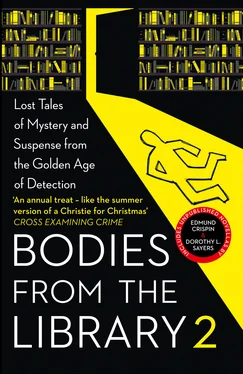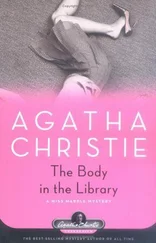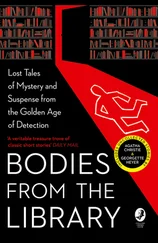Helen Simpson CONTENTS Cover Title Page BODIES FROM THE LIBRARY 2 Forgotten stories of mystery and suspense by the Queens of Crime and other Masters of the Golden Age Selected and introduced by Copyright Introduction NO FACE Christianna Brand BEFORE AND AFTER Peter Antony HOTEL EVIDENCE Helen Simpson EXIT BEFORE MIDNIGHT Q Patrick ROOM TO LET Margery Allingham A JOKE’S A JOKE Jonathan Latimer THE MAN WHO KNEW Agatha Christie THE ALMOST PERFECT MURDER CASE S. S. Van Dine THE HOURS OF DARKNESS Edmund Crispin CHANCE IS A GREAT THING E. C. R. Lorac THE MENTAL BROADCAST Clayton Rawson WHITE CAP Ethel Lina White SIXPENNYWORTH John Rhode THE ADVENTURE OF THE DORSET SQUIRE C. A. Alington THE LOCKED ROOM Dorothy L. Sayers Acknowledgements Also available About the Publisher
Henry Brodribb was engaged in an argument with his wife; or, rather, he was pacing the room, wordless, trying to take in the sense of her final proposal. His wife, calmly stitching an undergarment, watching him, was aware of his throes, and allowed time to elapse before she continued:
‘It’s no good our going on living together when there’s no reason for it and we don’t suit each other.’
‘Don’t we?’ interjected Mr Brodribb ironically.
‘No,’ said his wife, disregarding the irony, ‘we don’t. Now, Arthur and I do. We like the same sort of plays, and there’s bridge, and he’s ever so good-looking. But, as I said to him, I won’t have anything underhand.’
‘Nothing underhand,’ Mr Brodribb repeated, ‘only a pack of lies for me to tell in court. Only perjury and collusion. What about the King’s Proctor?’
‘People can’t be expected to tell the truth,’ said his wife comfortably, ‘with the silly way the law is. I’m sure if there was any other reason they’d let you have, I’d have no objection to your divorcing me. But there’s only infidelity for a woman. As I said, there’s never been anything of that between me and Arthur. Besides, it wouldn’t be good for him in his business.’
‘And what about my business?’ Mr Brodribb inquired, sarcastically.
‘You’ll be all right,’ his wife replied, disregarding the sarcasm. ‘Nobody’d ever dream of your doing anything wrong. It ’ud be a change for both of us.’
To this Mr Brodribb’s imagination gave involuntary assent. He pictured home without Cissie, a life free from comment, in charge of a good cook-housekeeper. It was alluring. Also, he could move from the country into the town. But he sounded a protest, as was right.
‘I never heard of such a thing. I won’t listen to another word about it.’
And he sat down in the chair opposite hers and shook out his evening paper. Mrs Brodribb, biting off a length of yellow silk. resumed:
‘Nobody thinks anything of it, nowadays. Look at these countesses, and Lady This and Lady That; always in and out of the divorce courts.’
Mr Brodribb beat the paper into more convenient folds and replied severely:
‘We’re not countesses.’
It was a shot fired in flight, at random, which could not give pause for an instant to the victorious advance of his wife. She had made up her mind.
Mr Brodribb realised this, and was appalled. Only once before had he known her to make up her mind. She had not argued with him then, but she had used other methods without scruple, and he had turned up at the church on the day she named. Having secured him by this display of resolution she had laid decision aside until now, when all the slow force of her will was once more arrayed to be rid of him. Cowering behind his paper, Mr Brodribb sank deeper into his chair and prepared to offer such resistance as pride demanded.
‘I was afraid,’ said Mrs Brodribb calmly, ‘that it might be expensive. But it’s not so very, Arthur says, if the case isn’t defended. Arthur’s been finding out about it. Of course, he’d share expenses. Arthur—’
‘How dare you mention that fellow’s name to me?’ Mr Brodribb inquired. ‘It’s bare-faced. You don’t seem to have any sense of what’s right and proper.’
‘I’ve told you,’ Mrs Brodribb answered with dignity, ‘there’s nothing wrong at all between me and Arthur. And won’t be.’
Mr Brodribb dashed down his paper, rose, and retired to the only refuge that owned him for master, the tool shed. Mrs Brodribb showed no emotion at his exit, did not lift her eyes from her sewing; but some minutes later she smiled.
This was the first of a series of encounters whereby, at the end of a fortnight, Mr Brodribb was finally brought to reason. Towards the result his wife’s arguments contributed in some degree; but in the main she owed her victory to that unknown ally, Mr Brodribb’s imagination, which displayed him to himself a free man. Only that wicked preliminary, the necessary infidelity, alarmed him. He made guarded inquiries, confirmed Arthur’s estimate of the expense, and admitted one evening that he might think it over. His wife kissed him, and telephoned to Arthur to come round at once.
The meeting passed off without awkwardness, owing to Arthur’s tactful praise of Mr Brodribb’s generosity. Indeed, the evening ended with a kind of impromptu supper, during which healths were drunk in whisky and water. After all, as Mrs Brodribb pointed out, it was not as if they had any of them anything to be ashamed of. It was she who steered the men towards action, with:
‘All very fine, but what do we do first? You can’t sit with your hands folded and expect a judge to come to you.’
Mr Brodribb involuntarily consulted Arthur with his eyes.
‘Restitution of conjugal rights,’ said Arthur, responding. ‘That’s the first step.’ Mr Brodribb cleared his throat.
‘No question of that, old man. Restitution, I mean. She’s never been deprived.’
‘Well, you’ve got to deprive her,’ said Arthur.
Mr Brodribb looked helplessly about the comfortable room; at the ferns he had tended all the winter long; at the black marble clock, shaped like a tomb, that the firm had given him on his marriage; finally, at his wife.
‘You don’t have to do it for long. You go to some nice boarding-house—there’s a little place in north London I could give you the address of, a private hotel—well, you go off, and you write Cissie a letter, saying you’re gone for good. Then off she goes to a solicitor and shows him the letter, and he sues you.’
‘What for?’
‘Restitution. You don’t answer him. He sues you two or three times more—’
‘Who’s going to pay for all this?’
Arthur waved the question from him.
‘And that’s all, as far as that goes.’ He coughed, and went on delicately: ‘There’s one or two other things. But you’d better get a solicitor to put you up to all the dodges.’
Mrs Brodribb, with healthy feminine contempt of delicacy, said:
‘Yes, the infidelity; what about that? I don’t know that I like the idea of Henry going off with goodness knows who.’
‘I think you’ll find,’ Mr Brodribb ventured at last, ‘that it’s only a form.’
‘That’s it,’ Arthur agreed, relieved; ‘that’s all. A form.’
Mrs Brodribb, with feminine bad taste, laughed.
‘Fancy, Henry!’ said she.
They separated, and Mr Brodribb, making his way to the spare bedroom, felt that he had taken that night another step towards freedom. Next morning, at breakfast, it was arranged that he should leave home on the following Monday.
‘It’s always nicer,’ said Mrs Brodribb, ‘to start the week clear.’
The intervening days went smoothly by. Mr Brodribb secured a room in the little place in north London at a reasonable figure. During the Friday lunch hour he was measured for a new suit. At home Mrs Brodribb passed his underclothing in review, darned, packed, and began to look younger. With the near prospect of escape, home became tolerable to both. They were considerate and friendly.
Читать дальше











